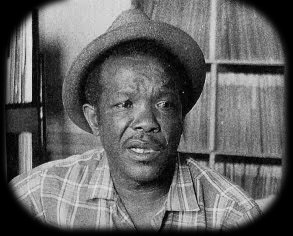 Frankie Lee Sims was a Texas Blues guitarist with a rocking, roughed-up style that gave him some early regional popularity and one national hit record in the 50s. He lived a rough life too, and got into the kind of trouble that scared record companies away, so he didn’t figure in the Folk/Blues revival ten years later that made his cousin Lightnin’ Hopkins a world star.
Frankie Lee Sims was a Texas Blues guitarist with a rocking, roughed-up style that gave him some early regional popularity and one national hit record in the 50s. He lived a rough life too, and got into the kind of trouble that scared record companies away, so he didn’t figure in the Folk/Blues revival ten years later that made his cousin Lightnin’ Hopkins a world star.
Born in 1917, Frankie left his native New Orleans at the age of 12 and took his guitar to Marshall in East Texas where his cousin Sam Hopkins was making a name for himself. The kid played his guitar for tips, but when WWII came along, he was drafted. On his return from duty with the Marines, Frankie settled in Dallas and began playing the local club scene, often in the company of
Smokey Hogg. Frankie’s solo recordings on the Blue Bonnet label had some regional success, but when he signed for the Specialty label in 1953, his ‘Lucy Mae’ was a national chart hit. Texas Blues was enjoying success on the
West Coast, but Frankie’s follow-ups did not repeat that initial impact when he moved there, and neither did his recordings on the Ace and Fire labels in the late 50s. Hard rocking tunes like ‘Walking with Frankie’ and ‘ She Likes to Boogie Real Low’ were great songs, but failed to find a market and he returned to Dallas around 1960.
Frankie’s excellent original version of ‘Lucy Mae Blues’;
Frankie Lee Sims Discography
This 20 track compilation gathers together the best of Frankie’s singles recorded in his most productive period on the West-coast. Frankie’s Blues style has a primitive quality that harks back to the days of juke-joints and fish-fries, and he wrote some good songs too.
Lucy Mae
When the Folk/Blues revival gathered pace, Frankie’s cousin Lightnin’ Hopkins was discovered playing in small bars in Houston, and was soon propelled onto the world stage, but the wave of interest passed Frankie by. He was very fond of the bottle and had some trouble with The Law over a shooting incident. Frankie played bar gigs in Dallas throughout the 60s, until he was laid low by a bout of pneumonia in 1970, and quickly passed away.
 Frankie Lee Sims was a Texas Blues guitarist with a rocking, roughed-up style that gave him some early regional popularity and one national hit record in the 50s. He lived a rough life too, and got into the kind of trouble that scared record companies away, so he didn’t figure in the Folk/Blues revival ten years later that made his cousin Lightnin’ Hopkins a world star.
Frankie Lee Sims was a Texas Blues guitarist with a rocking, roughed-up style that gave him some early regional popularity and one national hit record in the 50s. He lived a rough life too, and got into the kind of trouble that scared record companies away, so he didn’t figure in the Folk/Blues revival ten years later that made his cousin Lightnin’ Hopkins a world star.